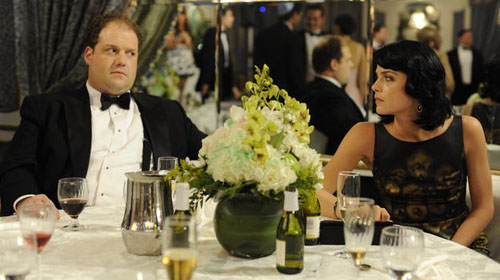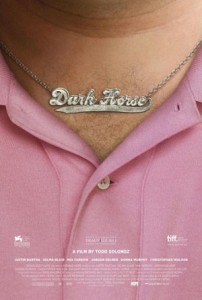Love In The Suburbs
Written by: FFT Webmaster | June 14th, 2012
Writer/director Todd Solondz is a film poet of the suburbs. Drawing on his own experiences in the arid climes of suburban New Jersey, he has produced an oeuvre filled with desperate characters clutching at the evasive gifts of happiness and security, with a gnawing desperation that is as uncomfortable to watch as it is to live. At their best (WELCOME TO THE DOLLHOUSE, HAPPINESS), he achieves a kind of grace that allow his characters to reflect on their limited prospects and find some degree of balance in their deeply dysfunctional lives.
 In his latest suburban poem DARK HORSE, Jordan Gelber gives a full-out performance as Abe, a schlubby thirty-something loser who still lives with his parents (an almost unrecognizable Christopher Walken and Mia Farrow), half-heartedly works in his father’s office and spends all his time buying Thundercats toys on eBay. While others may treat him with tsk-tsk condescension, in his own mind, Abe thinks he is kind of cool. That may explain his sudden surge of confidence where he meets a heavily-medicated depressive Miranda (played with narcotic charm by Selma Blair), who has just moved back in with her parents. From Abe’s point of view, he has found a kindred spirit and perhaps even his soul mate. He pressures the young beauty for a date and when she reluctantly agrees, finds herself on the receiving end of a wildly inappropriate marriage proposal. “I want to want you,” she tells him apologetically. His response is desperate and pathetic, but Gelber sells the loneliness under the surface when he tells her, “That’s enough for me.”
In his latest suburban poem DARK HORSE, Jordan Gelber gives a full-out performance as Abe, a schlubby thirty-something loser who still lives with his parents (an almost unrecognizable Christopher Walken and Mia Farrow), half-heartedly works in his father’s office and spends all his time buying Thundercats toys on eBay. While others may treat him with tsk-tsk condescension, in his own mind, Abe thinks he is kind of cool. That may explain his sudden surge of confidence where he meets a heavily-medicated depressive Miranda (played with narcotic charm by Selma Blair), who has just moved back in with her parents. From Abe’s point of view, he has found a kindred spirit and perhaps even his soul mate. He pressures the young beauty for a date and when she reluctantly agrees, finds herself on the receiving end of a wildly inappropriate marriage proposal. “I want to want you,” she tells him apologetically. His response is desperate and pathetic, but Gelber sells the loneliness under the surface when he tells her, “That’s enough for me.”
 Solondz’s recent work has been as notable for its experiments in form as for its outrageous content, whether in PALINDROMES’ use of a dozen actors to play a single character, or STORYTELLING’s paired mini-features. With shock value taking a back seat in DARK HORSE, the director allows himself the freedom of making the second half of his film almost surreal with a questioning of the reality of Abe’s true circumstances that comes to define the picture. Is everything we have seen just a figment of Abe’s skewed point of view? In its second half, the film takes a definite left turn into layered, interlocking dreams, fantasies and imaginings. Solondz is canny enough to pull it off (just), inviting the audience to fill in the blanks and find their own interpretation (a daring concept that had endeared Solondz to European critics and audiences more than American ones in the past decade).
Solondz’s recent work has been as notable for its experiments in form as for its outrageous content, whether in PALINDROMES’ use of a dozen actors to play a single character, or STORYTELLING’s paired mini-features. With shock value taking a back seat in DARK HORSE, the director allows himself the freedom of making the second half of his film almost surreal with a questioning of the reality of Abe’s true circumstances that comes to define the picture. Is everything we have seen just a figment of Abe’s skewed point of view? In its second half, the film takes a definite left turn into layered, interlocking dreams, fantasies and imaginings. Solondz is canny enough to pull it off (just), inviting the audience to fill in the blanks and find their own interpretation (a daring concept that had endeared Solondz to European critics and audiences more than American ones in the past decade).
As a man desperately in need of growing up, character actor Jordan Gelber is perfectly cast as Abe, playing him as basically an overgrown child, angry at the world and seethingly jealous of his over-achieving brother (Justin Bartha). On the surface he’s laughably awful, but Gelber allows you to see the humanity and goodness that resides within. The film is festooned by several brilliant set pieces, including a highly embarrassing but go-for-broke sequence when Abe delightedly showing Miranda his bedroom, filled with children’s toys. Currently in theaters after a long wait, DARK HORSE should be viewed as yet another installment in Todd Solondz’s career-long examination of the lust for love and security among the deeply damaged.


